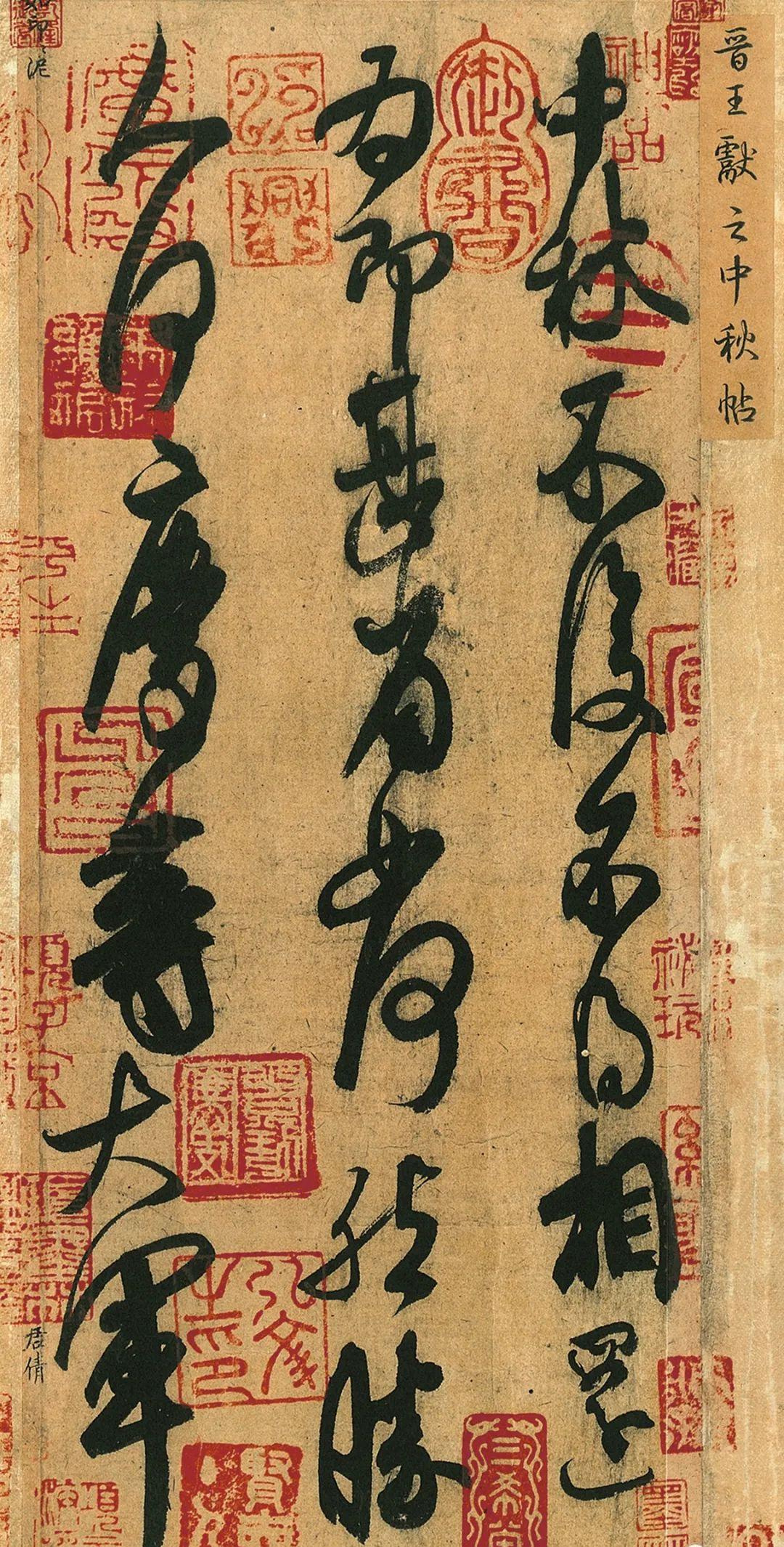Wang Xianzhi (344–386), courtesy name Zijing, was a native of Linyi (present-day Linyi, Shandong). Eastern Jin Dynasty official, calligrapher, painter, poet, seventh son of the Right Army general Wang Xizhi, son-in-law of Sima Yu, Emperor Wen of Jin, and father-in-law of Sima Dezong, Emperor An of Jin. Wang Xianzhi studied calligraphy intensively, and was famous for his calligraphy and cursive writing, and had a deep foundation in calligraphy and calligraphy. In the history of calligraphy, together with Wang Xizhi, he is called "Two Kings" and is known as "Little Sage". Together with Zhang Zhi, Zhong Xuan, and Wang Xizhi, he is also called the "Four Sages in the Book".

The Mid-Autumn Festival Thesis is rumored to be a letter written by Wang Xianzhi. "Mid-Autumn Festival" is connected by pen and pen, blood veins are connected, and it is a typical cursive writing. This way of writing, which originated from Zhang Zhi in the Eastern Han Dynasty, is called "a book of one stroke". The "Mid-Autumn Festival" is flying, the wind god is scattered, and the arrogance is exuberant, which is indeed more than his father Wang Xizhi.
Dong Qichang inscription
The original text of the "Mid-Autumn Festival" is: "The Mid-Autumn Festival is no longer restored, that is, how to defeat the people He Qing and other armies in the province." There is no unified translation of this from all walks of life, and there are probably the following sentences and translations:
The first translation
"If the Mid-Autumn Festival does not return, it must not be returned, so why save it?" How can you celebrate? and other armies. Translated into the vernacular: "After the Mid-Autumn Festival, relatives cannot come back to reunite, how about visiting relatives at this time?" What is there to celebrate (if you have lost a loved one) in such a victorious battle? Wait for the return of the army (meaning waiting for the return of relatives). ”
The second translation
"Mid-Autumn Festival. No more. Also, even more, how about the province? Ran shengren He Qing and other large armies. Translated into the vernacular: "The Mid-Autumn Festival has arrived!" If you don't respond to me, you don't come back. Just do it, think about it? It's victory, defeating the opponent, so what? Do you want to have a big celebration? Will the mighty army still be victorious? “
The third translation
There is also a saying that the original post of the "Mid-Autumn Festival" before the "Mid-Autumn Festival" was less than the six characters of "Cut to No in December", rather than ten words missing. This is also the reason why the "Mid-Autumn Festival" is also known as the "December Post". This creates even greater confusion for the broken sentence.
Qianlong inscription
The "Mid-Autumn Festival" is an incomplete copy of Wang Xianzhi's "December Cutting Post" engraved in the Baojin Zhai Fa Ti, and the original post also has the words "December cut to no" before the "Mid-Autumn Festival". The post was written on bamboo paper, which could not be fashioned in the Eastern Jin Dynasty and appeared around the time of the Northern Song Dynasty. It can be seen from the line pen that the brush used is a soft heartless pen, while the Jin Dynasty uses a hard pen with a heart, which is poor in water absorption, and the pen's lifting, pressing, and turning are often not flexible and free, often out of thieves, so that the rich and rounded, coherent lines, line penetration, and elegant and flowing effect of the post cannot be written. Qing Wusheng's Great View Record Yun: This handwriting is ancient and thick, and the ink is fresh and moist, but it is like a fat, although it is not hooked, I am afraid that it is imitated by the Song people. According to the research of contemporary calligraphy and painting experts, most of them believe that Song Mi fu came, so it is equally valuable.
Xiang Yuanbi inscription
The inkblot of the December Thesis was preserved in the Northern Song Dynasty, and was once collected by Mi Fu, and is one of the three Jin people's legal books treasured in Mi Fu's "Bao Jin Zhai". In 1004, when Mi Fu knew that there was no military force, he copied the "December Thesis" with Wang Xizhi's "Wang Liu Thesis" and Xie An's "August 5th Post". Now we can only see the Southern Song Dynasty Cao Zhi Ge engraved "Baojin Zhai Fa Ti" expanded version.
Ding Guanpeng painting
"December Thesis" calligraphy posture, the initial stroke of the line, thick and short strokes, the fourth word "cut" for the transition, the following is the fluent line cursive strokes continuously, a stroke written, the words and words are occasionally not connected, but the blood vein is continuous. The size of the glyphs is wrong, and the dense variation of the knots is similar to the gathering and dispersion of clouds and mist, and the opening and closing are free. The whole gesture is quick and painful by Xu Xing, and the gesture is like smoke and fog, more like an electric shock star stream. At the end of the post, the four characters of "Qing and other armies" are bold, and the boldness of the gesture expands the glyphs, and the momentum is particularly bold. Wang Xianzhi's cursive handwriting is mostly a mood of transcendent leisure and unhurried travel, and only the "December Post" is extremely cursive and indulgent, and it is straight and twisted, and the most popular. Mi Fu commented in the "History of Books" that this post is like drawing words on the ashes of firewood with fire chopsticks, which is continuously entangled, and there is no trace of connection, as if it was written inadvertently, it is called "a book of one stroke", which is the first Legal Post of Wang Xianzhi circulated in the world.
(Please view the phone horizontally)